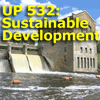Description
Programs across campus now engage the issue of sustainability. As an urban planning course, this course emphasizes the local and regional scale of sustainability; the role of planning, land policy, local economic development, and regional planning; and the relationship between human settlement patterns and environmental consequences. We examine the conflicts between local economic development, environmental protection and social justice -- and planning strategies to resolve these conflicts. The focus is local, spatial, institutional, pluralistic. We will engage "sustainability" both as a useful organizing principle for community planning and as a problematic concept to be challenged, modified and updated.
Themes of the course will likely include:
- the historical emergence of the idea of sustainability in urban planning
- the current state of sustainability thinking in the planning profession (e.g., sustainability guidelines by the American Planning Association)
- the relationship between sustainable development and environmental planning
- land use & sprawl (the compact city debate); the environmental impact of urban, suburban and rural settlement types.
- traditional and alternative urban environmental economics
- public health, population health and sustainability
- efforts by cities to measure local sustainability
- local sustainability plans; local sustainability offices and jobs
- cities and water scarcity
- sustainability vs. resilience vs. conservation
- market vs. regulatory approaches to sustainability
- sustainability and social justice
- sustainability in an era of climate change
- regional planning and sustainability (with an emphasis on river basins, regional transit and land policy), including the role of COGs and MPOs.
- California's current regional sustainability programs (in response to AB 32 and SB 375).
- international examples of urban sustainability; sustainability in megacities
- changing theoretical approaches to sustainability and city-nature relationships. (for example, see this student-driven blog from UP650: Advanced Urban Theory: "First Nature, Second Nature, City")
This course complements several other courses offered in the program, including: UP 502 Environmental Planning: Issues and Concepts (Prof. Pimentel Walker, fall semester); and UP 533 Sustainable Urbanism and Architecture (Prof. Douglas Kelbaugh, fall semester).
Prerequisites
Graduate standing or permission of instructor. The course has no formal prerequisites. Students from other programs (e.g., SNRE, Ford School, Public Health, Architecture, Social Work, Civil Engineering, Business, Law, LS&A, etc.) are encouraged to participate. Questions? Feel free to email me.
Assignments
Assignments will include both individual and group projects, with an emphasis on case studies of localities, regions, and local/regional sustainable planning programs and on local tools to measure and promote sustainability. Students
are expected to complete all the required readings before the scheduled
class time, actively participate in class discussions and presentations,
and prepare several written assignments over the semester. The class format will be a hybrid of lecture, seminar, and interactive class projects/scenarios.
Readings:
Readings will consist of articles (available via ctools) and several texts (some available online through the UM Library "Ebrary"). Reading list to be posted by January.
Suggested Background Readings (wholly optional, but if you want to read some good books...):
Wheeler, Stephen, and Timothy Beatley. 2004. The sustainable urban development reader, The Routledge urban reader series. London ; New York: Routledge.
Gandy, Matthew. 2002. Concrete and clay : reworking nature in New York City, Urban and industrial environments. Cambridge, Mass.: MIT Press. [NOTE: electronic text also online via UM Library's NetLibrary.]
Williams, Raymond. 1980. "Ideas of Nature," in Culture And Materialism: Selected Essays. London: Verso, pp. 67-85.
Nik Heynen, and Maria Kaika and Erik Swyngedouw. 2006. In the nature of cities : urban political ecology and the politics of urban metabolis. Routledge. [see google books version]
Reisner, M. 1993. Cadillac desert: the American West and its disappearing water. revised ed. New York and London: Penguin Books. (see also google book preview)
McHarg, Ian L. 1969. Design with nature. Garden City, N.Y.: Natural History Press. (excerpt: pp. 1-29)
Cronon, William, editor. 1995.Uncommon Ground: Rethinking the Human Place in Nature, New York: W. W. Norton & Co, 69-90. [link]
Cronon, William. 1991. Nature's metropolis: Chicago and the Great West. 1st ed. New York: W. W. Norton.
Power, Thomas Michael. 1998. Lost Landscapes and Failed Economies:
The Search for a Value of Place. Covelo, CA: Island Press.
Beatley, Timothy, and Peter Newman. 2009. Green urbanism down under : learning from sustainable communities in Australia. Washington, DC: Island Press.
American Planning Association. "Incorporating Sustainability Into the Comprehensive Plan," (PAS Essential Info Packet) |

